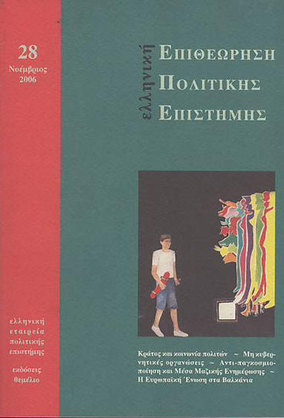Οικονομικές συνθήκες και εκλογική συμπεριφορά : οι κομματικές προτιμήσεις των ανέργων σε περιόδους κρίσης απασχόλησης
Part of : Ελληνική Επιθεώρηση Πολιτικής Επιστήμης ; No.6, 1995, pages 79-120
Issue:
Pages:
79-120
Parallel Title:
Economy and electoral behaviour : the party preferences of the unemployed under employment crisis
Author:
Abstract:
This article deals with the relation between unemployment and electoral behaviour. The central question is whether unemployment, viewed as an economic issues, may have an impact or even convert electoral behaviour. Particular emphasis is given, therefore, to the interrelation between macroeconomic and political variables, found in theories of «political economic cycle» and «economic voting». It is argued that fiscal situation and the way the voters understand it is closely linked to their consolidated party preferences, which, are shaped through a combination of conjectural and long-term structural factors.As far as specific electoral behaviour of the unemployed is concerned, three working hypotheses are made in this article: (1) the apathy hypothesis, (2) the mobilization (radicalization) hypothesis, and (3) the realignment hypothesis. Although certain empirical surveys are conducive to definite theoretical conclusions, one can hardly maintain that there is a single dense theory of the unemployed people’s electoral behaviour. Based on the available empirical and theoretical material, the author claims that the electoral behaviour of the unemployed is multifaceted. Decreased non-voting and political interest, preference of governmental parties supported by traditional clientelistic bonds, or/and the rising of anti-governmental attitudes as well as the twist towards the extremes of the party systems attended by non-conven- tional forms of political participation, are some of the possible political reactions of the unemployed which are in need of thorough study and verification suggested in this article.
Subject (LC):
Notes:
Περιέχει βιβλιογραφία




